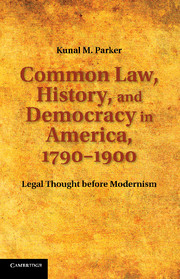7 - Conclusion
Published online by Cambridge University Press: 03 May 2011
Summary
The seeds of this book have been both a theoretical interest in the relationships among law, democracy, and history and a lingering curiosity about the ways these relationships have been – and continue to be – conceived of in the contemporary American academy.
Let me first set forth the theoretical dilemma. Crudely put, one widely recognized difference between politics and law is their relationship to time. Politics, unlike law, does not depend upon identity over time. Law, in order to be law, appears to depend precisely upon some measure of identity over time. (This identity could inhere in pretended atemporal foundations such as logic, reason, and morality or in a simple but faithful repetition of the past.) Unlike political resolutions of questions, law promises to treat like cases alike, regardless of when they arise in time. The call to historicize and contextualize law – to individuate the legal pronouncement by pinning it down in historical time – is, in this sense, an attempt to break law's pretensions to continuity, to rob it of its claim to identity over time, in short, to politicize it. In the terms in which I began this book, this is precisely the goal of the Holmesian modernist historical enterprise: that of pulling down law's pretense at atemporality by locating it in historical time so as to erode the boundary between law and politics.
- Type
- Chapter
- Information
- Common Law, History, and Democracy in America, 1790–1900Legal Thought before Modernism, pp. 279 - 292Publisher: Cambridge University PressPrint publication year: 2011



